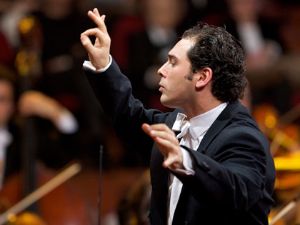Concert
Deutsches Symphonie-Orchester Berlin
Inauguration concert Tugan Sokhiev

Tugan Sokhiev © Patrice Nin
In his ballet music Pulcinella (1919/20), Stravinsky was drawn into a creative grapple with the past. Stravinsky based his work on scores that, at the time, were all attributed to the Baroque composer Pergolesi, using them playfully and irreverently as building bricks for a new style sharpening the contours, compressing, shifting and remounting the material.
In his American exile, Stravinsky later revised several of his previous works, including Pulcinella. However, the changes were ultimately small. His main motivation for revising the work seems to have been to secure the work’s rights, as Stravinsky had a large family to feed.
Emily Dickinson lived in the 19th century, in Massachusetts. This shy poet, who never left her home region, created an original cosmos in her 1775 poems which were published posthumously. Dickinson’s poems demonstrate astonishingly progressive characteristics: free forms, mental leaps and a ruptured syntax. Aaron Copland chose twelve of her poems for his song-cycle Eight Poems, setting them with extreme sensitivity. “The poems have no common theme. They are about the things that were close to Miss Dickinson’s heart: nature, death, life, eternity”, he explained. He hoped, nevertheless, through his musical setting to have created a correspondence with the unique personality of the poet, binding the poems cyclically. What the modest composer discreetly left unmentioned is that his songs helped the works of the long neglected writer to become more widely known.
Sergei Rachmaninoff, one of the most popular pianists of his time, was widely fêted in his day, due to his concerts in the USA. His piano music – above all, his popular Prélude and the piano concerti, which he often performed himself – left audiences ecstatic. But the Americans gave him the cold shoulder at the Philadelphia premiere of his third symphony in 1936, which contained new aspects for the symphonic genre. He later wrote to a friend in Moscow: “Its reception by both the audience and critics was sour. One review sticks painfully in my mind: that I didn’t have a Third Symphony in me any more. Personally, I am firmly convinced this is a good work. But … sometimes composers are mistaken too! Be that as it may, I am holding to my opinion so far.”
This concert, in which mezzo-soprano Susan Graham interprets Aaron Copland’s songs, marks the official inauguration of Tugan Sokhiev as new chief conductor of the Deutsches Symphonie-Orchester Berlin (DSO).
Igor Stravinsky [1882-1971]
Pulcinella
Suite for orchestra orchestra [1919-20, rev.1949]
Aaron Copland [1900-1990]
At the River
Simple Gifts
Little Horses
from Old American Songs
William Bolcom [*1938]
The Ballad of Black Max
Amor
from Cabaret Songs
“From the American Stage”
Samuel Barber [1910-1981]
Must the Winter Come So Soon? from Vanessa
Leonard Bernstein [1918-1990]
What a Movie! from Trouble in Tahiti
Kurt Weill [1900-1950]
I’m a Stranger Here Myself from One Touch of Venus
George Gershwin [1898-1937]
Someone to Watch Over Me from Oh, Kay!
Sergej Rachmaninoff [1873-1943]
Symphony No. 3 in A minor op. 44 [1936]
Sasha Cooke mezzo soprano
Deutsches Symphonie-Orchester Berlin
Tugan Sokhiev conductor
A DSO Berlin event
in cooperation with the Berliner Festspiele / Musikfest Berlin